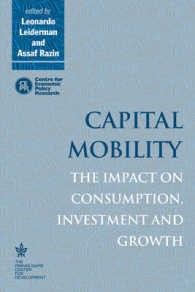- ホーム
- > 洋書
- > ドイツ書
- > Mathematics, Sciences & Technology
- > Biology
- > botanics
Full Description
Abiotic stresses such as drought (water deficit), extreme temperatures (cold, frost and heat), salinity (sodicity) and mineral (metal and metalloid) toxicity limit productivity of crop plants worldwide and are big threats to global food security.








